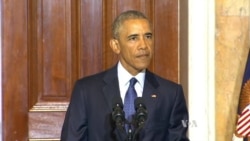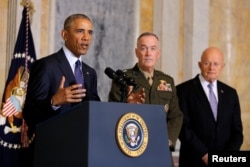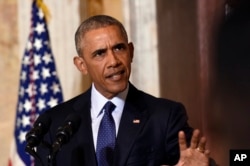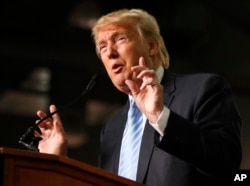Just a day after a mass shooting in Orlando, Florida, White House Press Secretary Josh Earnest was asked by reporters about pointed criticism from likely Republican nominee Donald Trump toward President Barack Obama for being “too politically correct” to utter the words “radical Islam” or “Islamic terrorism.”
Trump and others in his party have repeatedly said you can never defeat an enemy unless you define who it is you are fighting against.
Earnest dismissed the criticism as too “small” to comment on, in the face of the huge challenges the president is facing.
Fast-forward a day, and the tone changed dramatically.
Obama mounted a passionate defense of his strategy and the U.S. military’s record in the global campaign to destroy the Islamic State group.
And he revealed a seldom-seen flash of anger at Republican criticism of his refusal to say “Islamic terrorists.”
Trump has repeatedly described Obama's efforts to defeat Islamic State terrorists in the Middle East as weak and said the United States has to take much tougher military actions against IS fighters and keep foreign-born Muslims out of the U.S. to thwart additional possible terrorist attacks.
Flanked by his top national security advisers, Obama asked: “What exactly would using this label accomplish? What exactly would it change?
"Would it make ISIL [an acronym for the group] less committed to killing Americans? Would it bring in more allies? Is there a military strategy that would be served?” he asked.
Choice of words
The president explained his choice of words, saying: "The reason I am careful has nothing to do with political correctness and everything to do with defeating extremism."
He pointed out that several of the coalition partners in the fight against the Islamic State group are Muslim majority countries, adding that U.S. and coalition forces know exactly who they are fighting, and they have ISIL on the run.
Obama said the territory controlled by Islamic State is shrinking, morale is plummeting, its ranks are shrinking and are now down to the lowest levels in 2½ years. He said the coalition has cut IS oil revenues by millions of dollars each month.
Obama, who is usually measured in his responses, continued. Without mentioning his name, he directed his comments to Trump, saying his “loose talk” is making Americans less safe.
“We now have proposals from the presumptive Republican nominee for president of the United States to bar all Muslims from immigrating to America. You hear language that singles out immigrants and suggests entire religious communities are complicit in violence. Where does this stop?" Obama asked.
"The Orlando killer, one of the San Bernardino killers, the Fort Hood killer – they were all U.S. citizens. Are we going to start treating all Muslim-Americans differently? Are we going to start subjecting them to special surveillance? Are we going to start discriminating against them because of their faith?” the president questioned.
Obama, who has endorsed Trump's Democratic opponent, former U.S. Secretary of State Hillary Clinton, said Trump's proposal would betray the U.S. heritage of racial, ethnic and religious pluralism and not be "the America we want."
Responding to the president's criticisms, Trump said later Tuesday at a rally in Greensboro, N.C., that Obama was "more angry" at him than the gunman in the Orlando massacre.
Earlier in the day, Trump said the U.S. "must now get very tough, very smart and very vigilant. We cannot admit people into our country without extraordinary screening."
Counterproductive
Max Abrahms, a terrorism expert at Northwestern University in Boston, told VOA Tuesday he agreed with the president that Trump’s call for a ban on Muslims would be counterproductive in the fight against Islamic State, and could actually boost its recruitment efforts.
“One of the reasons why the United States has a less severe terrorism problem than other countries, like in France and in Belgium, is because the American Muslim community is relatively happy," Abrahms said.
"And we need to make sure that they continue to be happy, and the best way to turn them against us is to discriminate against them. And if we do that, not only will we breed more terrorists out of an otherwise peaceful population, but we will reduce our ability to be able to generate intelligence,"he said. "Because the American Muslim community is really on the front lines in terms of identifying to law enforcement people who may be undergoing a process of radicalization.”
‘Caliphate is crumbling’
Abrahms said there is substantial evidence to corroborate the Obama administration’s contention that the IS organization has been weakened, especially in its stronghold of Iraq and Syria.
A couple of years ago, IS was much more successful and appeared invincible, he said, but now “the dream of a caliphate is crumbling.”
Abrahms said there is almost an inverse relationship between IS success on the battlefield and its eagerness to claim responsibility for attacks on so-called “soft targets” – civilians – in the West.
Attacks such as the one in Orlando would not give IS a big boost, but would strengthen resolve in the West to destroy them, he said.
Daniel Pipes, president of the Middle East Forum, told VOA Tuesday that he had a much bleaker assessment of the Obama administration’s policies and of the situation on the ground in the Middle East, saying anarchy is spreading throughout the entire region.
“So my view is that U.S. policy should be to not try and transform the region as [former President] George W. Bush did, not try to abandon it as Barack Obama has done, but to have a sweet spot in the middle where we help our allies, we protect our interests, but we don’t try and fix things that’s not in the cards," Pipes said.
"And ... I don’t think in the end it is good for either us to take on too much responsibility or for the Middle Easters who then become infantilized because we’re doing their work for them. They should take responsibility for themselves; we should be there to assist," he said.








